Related Research Articles

Raúl Ricardo Alfonsín was an Argentine lawyer and statesman who served as President of Argentina from 10 December 1983 to 8 July 1989. He was the first democratically elected president after the 7-years National Reorganization Process. Ideologically, he identified as a radical and a social democrat, serving as the leader of the Radical Civic Union from 1983 to 1991, 1993 to 1995, 1999 to 2001, with his political approach being known as "Alfonsinism".
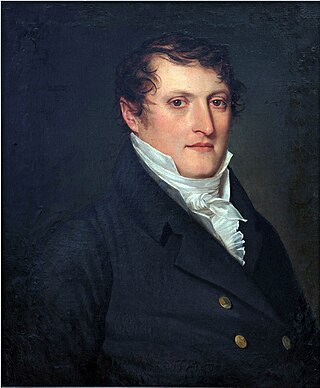
Manuel José Joaquín del Corazón de Jesús Belgrano y González, usually referred to as Manuel Belgrano, was an Argentine public servant, economist, lawyer, politician, journalist, and military leader. He took part in the Argentine Wars of Independence and designed what became the flag of Argentina. Argentines regard him as one of the main Founding Fathers of the country.

The Argentine War of Independence was a secessionist civil war fought from 1810 to 1818 by Argentine patriotic forces under Manuel Belgrano, Juan José Castelli, Martin Miguel de Guemes and José de San Martín against royalist forces loyal to the Spanish crown. On July 9, 1816, an assembly met in San Miguel de Tucumán, declaring independence with provisions for a national constitution.
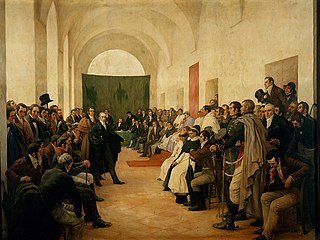
The May Revolution was a week-long series of events that took place from May 18 to 25, 1810, in Buenos Aires, capital of the Viceroyalty of the Río de la Plata. This Spanish colony included roughly the territories of present-day Argentina, Bolivia, Paraguay, Uruguay, and parts of Brazil. The result was the removal of Viceroy Baltasar Hidalgo de Cisneros and the establishment of a local government, the Primera Junta, on May 25.
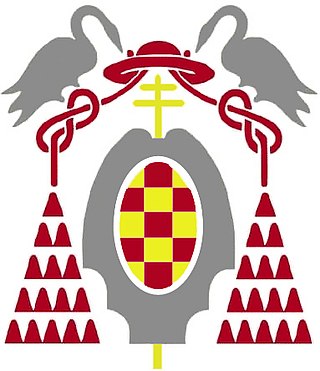
The University of Alcalá is a public university located in Alcalá de Henares, a city 35 km northeast of Madrid in Spain and also the third-largest city of the region. It was founded in 1293 as a Studium Generale for the public, and was refounded in 1977. The University of Alcalá is especially renowned in the Spanish-speaking world for its annual presentation of the highly prestigious Cervantes Prize. The university currently enrolls 28,336 students, 17,252 of whom are studying for undergraduate degrees, who are taught by a teaching staff of 2,608 professors, lecturers and researchers belonging to 24 departments. The administrative tasks are carried out by the university's Administration and Services, comprising approximately 800 people.

Mariano Moreno was an Argentine lawyer, journalist, and politician. He played a decisive role in the Primera Junta, the first national government of Argentina, created after the May Revolution.

Cornelio Judas Tadeo de Saavedra y Rodríguez was an Argentine military officer and statesman. He was instrumental in the May Revolution, the first step of Argentina's independence from Spain, and became the first head of state of the autonomous country that would become Argentina when he was appointed president of the Primera Junta.

Baltasar Hidalgo de Cisneros y de la Torre was a Spanish Navy officer and colonial administrator. He took part in the Battle of Cape St Vincent and the Battle of Trafalgar, and in the Spanish resistance against Napoleon's invasion in 1808. He was later appointed Viceroy of the Viceroyalty of the Río de la Plata, replacing Santiago de Liniers. He disestablished the government Junta of Javier de Elío and quelled the Chuquisaca Revolution and the La Paz revolution. An open cabildo deposed him as viceroy during the May Revolution, but he attempted to be the president of the new government junta, thus retaining power. The popular unrest in Buenos Aires did not allow that, so he resigned. He was banished back to Spain shortly after that, and died in 1829.
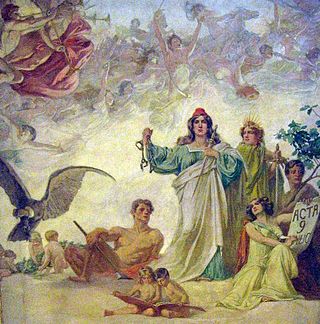
What today is commonly referred as the Independence of Argentina was declared on July 9, 1816, by the Congress of Tucumán. In reality, the congressmen who were assembled in Tucumán declared the independence of the United Provinces of South America, which is one of the official names of the Argentine Republic. The Federal League Provinces, at war with the United Provinces, were not allowed into the Congress. At the same time, several provinces from the Upper Peru that would later become part of present-day Bolivia, were represented at the Congress.
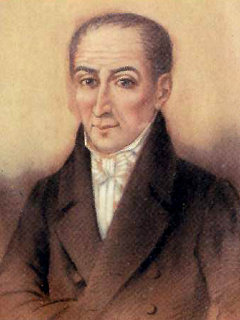
Juan José Esteban Paso, was an Argentine politician who participated in the events that started the Argentine War of Independence known as May Revolution of 1810.

Juan José Castelli was an Argentine lawyer who was one of the leaders of the May Revolution, which led to the Argentine War of Independence. He led an ill-fated military campaign in Upper Peru.

Domingo María Cristóbal French was an Argentine revolutionary who took part in the May Revolution and the Argentine War of Independence.

Miguel de Azcuénaga was an Argentine brigadier. Educated in Spain, at the University of Seville, Azcuénaga began his military career in the Viceroyalty of the Río de la Plata and became a member of the Primera Junta, the first autonomous government of modern Argentina. He was shortly exiled because of his support to the minister Mariano Moreno, and returned to Buenos Aires when the First Triumvirate replaced the Junta. He held several offices since then, most notably being the first Governor intendant of Buenos Aires after the May Revolution. He died at his country house in 1833.

Juan Larrea was a Spanish businessman and politician in Buenos Aires during the early nineteenth century. He headed a military unit during the second British invasion of the Río de la Plata, and worked at the Buenos Aires Cabildo. He took part in the ill-fated Mutiny of Álzaga. Larrea and Domingo Matheu were the only two Spanish-born members of the Primera Junta, the first national government of Argentina.
The rise of the Argentine Republic was a process that took place in the first half of the 19th century in Argentina. The Republic has its origins on the territory of the Viceroyalty of the Río de la Plata, a colony of the Spanish Empire. The King of Spain appointed a viceroy to oversee the governance of the colony. The 1810 May Revolution staged a coup d'état and deposed the viceroy and, along with the Argentine war of independence, started a process of rupture with the Spanish monarchy with the creation of an independent republican state. All proposals to organize a local monarchy failed, and no local monarch was ever crowned.

Cosita linda is a Spanish-language telenovela produced by Carlos Sotomayor and Peter Tinoco, and adapted by Nora Castillo for Venevisión and Univisión. It is distributed internationally by Venevisión International and Cisneros Media Distribution. It is a remake of the telenovela Cosita rica created in 2003 by Leonardo Padrón.

Amor secreto is a Venezuelan telenovela produced by Manuel Fedérico Fraiz-Grijalba for Venevisión. It is a remake of the 1980 telenovela Buenos días, Isabel. The telenovela is adapted by César Sierra, Juan Carlos Duque and Mayra Villavicencio.

Colección Patricia Phelps de Cisneros (CPPC) is a privately held Latin American art organization based in Venezuela and New York City founded by Patricia Phelps de Cisneros and Gustavo Cisneros.
Elbio Raúl Lozza was an Argentinian painter, draughtsman, designer, journalist, and theorist who was part of the concrete art movement. He was part of the Asociación Arte Concreto-Invención. He was the founder of the Perceptivist group. He was granted the Platinum Konex Award in Visual Arts from Argentina in 1992.

The Order of Cisneros is a state order of Spain created in 1944. It is named after Cardinal Francisco Jiménez de Cisneros. Primarily bestowed during the Francoist dictatorship and currently dormant, it rewarded political merit.
References
- Juan Carlos Cisneros at BDFA (in Spanish)
- Profile at Futbol XXI [usurped] (in Spanish)[ dead link ]
